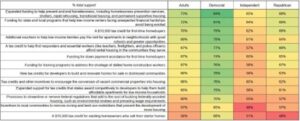Housing affordability is a pressing issue that impacts everyone. We can crunch all the numbers we’d like, calculate projections, and do our best to look into the crystal ball to help everyday people navigate the housing market. However, the most effective approach is often the simplest – considering public opinion. Nothing measures the impact of market pressures on families like their own attitudes, and nothing informs the actions of our Congressional representatives like the feelings of their constituents. Recognizing the value of the court of public opinion, especially in an election year, NHC partnered with the J. Ronald Terwilliger Center for Housing Policy at the Bipartisan Policy Center (BPC) and Morning Consult to conduct a survey measuring U.S. opinions on housing affordability.
The survey captures Americans’ attitudes on a range of housing issues, providing policymakers with insights into the real impact of unaffordability on families and individuals. Key takeaways reveal widespread and deep concern with 74% of respondents believing the lack of affordable homes is a significant problem. This sentiment is consistent across demographics and political affiliations, with 83% of Democrats, 71% of independents, and 68% of Republicans acknowledging the severity of the issue. Further, attitudes looking forward remain bleak – 65% reported that home prices in their community have become less affordable over the past year, and 52% expect this trend to continue. The survey results saw a 10% drop in renters expressing strong interest in homeownership since a previous September 2022 survey, signaling a notable depressed view of homeownership.
Given the current environment for renters and would-be homeowners, these findings are not surprising. Rising interest rates, inflation-driven housing costs, and lack of supply have collectively caused the income needed to afford a typically priced home in the U.S. to double in the last four years.
Nearly half of renters (49%) reported having difficulty paying their rent over the past 12 months, and over half (52%) reported a noticeable increase in homelessness, a 6% increase from the BPC’s May 2023 survey. According to NHC’s Paycheck to Paycheck Database, rents for two-bedroom apartments have increased on average by 33% since 2020, with some metropolitan statistical areas showing increases up to 62%. These increases mean more occupations are being priced out of comfortably renting an apartment each year, forcing individuals and families to make difficult choices about how to afford their monthly debts.
While this pessimism is not without merit, there is also hope. The survey results show continued bipartisan support for housing solutions, including expanded funding for homelessness services and eviction prevention, as well as supply-side programs like the Low-Income Housing Tax Credit Program and commercial property conversation that incentivize affordable housing development. Support for federal action on housing and legislative reforms is strong, with most respondents believing that the federal government is very or somewhat responsible for ensuring that families have safe, decent, and affordable housing. This was true for 77% of Democrats, 60% of Republicans, and 60% of Independents.

Importantly, a large majority of respondents (78%) identified passing bipartisan legislation to increase the supply of affordable homes and help address high housing costs as a top or important priority for Congress. That includes 87% of Democrats, 77% of Republicans, and 70% of Independents.
The message is undeniably clear. Housing affordability cannot be ignored this year, and it certainly cannot be ignored as an election priority. The housing crisis is being felt across the nation in urban and rural areas alike, by Democrats, Republicans, and Independents alike. As researchers, we rely on data to tell the story of what our neighbors are experiencing. However, it is vital we also remember to simply ask. This survey confirms that our growing concerns as housers who research and write policy are not unfounded – the effects of unaffordability are dire.
Housing transcends party lines. As we enter this election season, NHC, our members, and partners will continue to advocate fiercely for the need to address housing unaffordability for the people across the country who have weathered the storm long enough.

